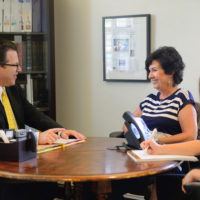Spend Time in 2 states?
By: Bernard A. Krooks
Source: Poughkeepsie Journal
Get informed on the laws…
Research can help avoid unwelcome surprises for you or your family
We live in a mobile society, where it’s common to spend significant time away from home visiting the grandkids or escaping winter weather. NewYorkers comprise the single largest segment of Florida’s temporary residents, withmany ultimately relocating on a permanent basis. But those address changes could complicate your estate planning, long-term-care arrangements and tax bill. In general, if you spend 183 days per year in a state, its residency laws kick in, so it’s important to keep track of calendar
days. And if you decide to move permanently, you should check that the legal documents framed in one state will be recognized elsewhere.
Estate Planning
The regulations governing trusts and advance directives vary throughout the country. Even a difference in the number of witnesses required to acknowledge a document can render void. Doctors and hospitals have been known to disregard the instructions contained in living wills and healthcare proxies that were drafted in another state. Banks could ignore directives from your designated financial agent. And it could be devastating to the financial security of loved ones to discover that a relocation has rendered your prior planning invalid. If you have important ties to more than one state, be sure your estate planning documents explicitly describe the situation. It’s also useful to consult legal counselfromthe relevant jurisdictions. That ensures that advantageous differences in state law are considered, and it’s less likely that recent legislation will be overlooked. Long-term care Since Medicaid is often a major source of funding for long-term care, differing state guidelines could complicate
a sudden, debilitating medical condition. Eligibility requirements, as well as covered services, often vary. In a previous column, I discussed “filial responsibility” laws, which could potentially hold adult children responsible for their parents’ expenses. These are state-specific and evolving, so lapses in Medicaid coverage have the potential to result in big bills for the younger generation. Work through the scenarios with certified elder-law attorneys who can navigate the Medicaid systems of whichever states you or your parents are likely to call home in later years.
Taxes
Another possibility is that more than one state will hold you liable for income or inheritance taxes. Residency audits are increasingly common, and New York is especially aggressive, with taxpayers expected to provide documentation that establishes where they’re spending their time. Nor is that the sole determinant. You must take active steps to relinquish New York residency
— possibly including the sale of real estate — in order to establish another domicile. For many couples, second homes and frequent travel represent a lifetime’s hard work and investment. With some forethought, you can ensure that your chosen lifestyle doesn’t have costly, unintended consequences.
Bernard A. Krooks is managing partner of the law firm Littman Krooks LLP (http://www.littmankrooks.com); 845-896-1106), with offices in Fishkill, White Plainsand Manhattan. His firm collaborates with Solkoff Legal, P.A., Delray Beach, Fla., on dual residency issues.











